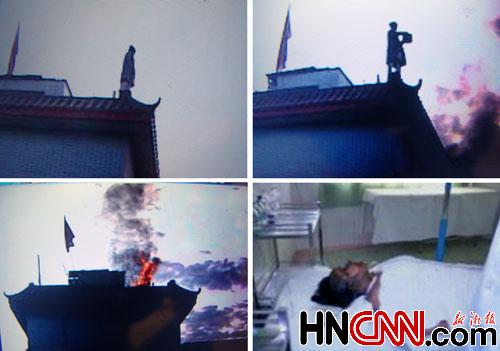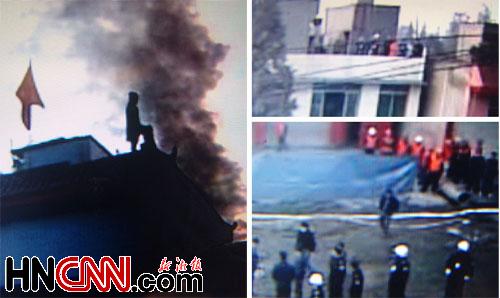Society
- Details
- By David Cao
- Hits: 696

The whole process : she set herself on fire and in hospital

Policemen with white halmet stood on the ground watching her burnning.
Recent years, real estate is become the main GDP factor of China, and the growth of property price in China is 2 times higher than the growth of its GDP.
So the primary job of government is to ensure the house price growth is quicker than last year. To achieve that Chinese local government find out a lot of ways. The main method is to encourage the local real estate developer to dismantle low buildings and build up new skyscrapers.
The following question is what if the house owner of the low building don't want relocation? Well, that the story of today.
The lady house owner who own a house in Chengdu China fight against house dismantling by setting herself on fire.
As the western media said before in China there is no human right. Local government sent more than 20 police to her house and "arrested" 7 family members of her without showing any document, under the name of trying to fight against the relocation order.
Her husband told NHCNN.COM, this time 4 family members are wounded seriously, 2 of them are still in danger, the "arrested" relatives are still in custody, but not in police station, strangely in a remote hotel.
After her was sent to hospital, the local government successfully take her low building down without interrupt.
- Details
- By David Cao
- Hits: 696

People visit the Taiji Museum in Chenjiagou village of Wenxian county, central China's Henan Province, on Aug. 21, 2009.


Practitioners perform Taiji in front of the Taiji Museum in Chenjiagou village of Wenxian county, central China's Henan Province, on Aug. 21, 2009. Chenjiagou village in the county, the birth place of Chen style Taiji, one of most famous Chinese internal martial arts, is among the most favored destinations for the tourists in the province.

Three practitioners perform Taiji in a stage in this photo taken on Aug. 21, 2009 in Wenxian county of central China's Henan Province. Chenjiagou village in the county, the birth place of Chen style Taiji, one of most famous Chinese internal martial arts, is among the most favored destinations for the tourists in the province.
- Details
- By David Cao
- Hits: 653

Transport ground to a halt as heavy fog enveloped southwest China's Sichuan Province Wednesday forcing airports and expressways to close to traffic.
According to local meteorologists, the cities affected included Chengdu, the provincial capital, Dazhou, Leshan and Meishan.
In Chengdu, Shuangliu International Airport closed at around 6:50 a.m., as visibility fell below 50 meters. It resumed normal operations at around 11 a.m. when the fog dispersed.
Read more: Heavy fog hampers transport services in Chinese cities
- Details
- By David Cao
- Hits: 721
Australian Prime Minister Kevin Rudd on Wednesday announced 50 of the best and brightest university students from Australia and Asia have received the Prime Minister's Australia Asia Endeavour Award.
The Prime Minister's Australia Asia Endeavour Award provides 20postgraduate students and 20 undergraduates from across Australia with up to 63,500 dollars (58,687 U.S. dollars) to undertake an international research, study and internship experience in either China, India, Indonesia, Japan, Malaysia, Singapore, Republic of Korea, China's Taiwan, Thailand and Vietnam.
Ten international postgraduate students will also be funded to study in Australia.
Read more: "Australia Asia Endeavour Award" grands 50 students
- Details
- By Global Times
- Hits: 1263
A former local government official, dubbed the "super-expensive- cigarette director," was sentenced last month to 11 years in prison for accepting bribes.
Zhou Jiugen came under fire from Chinese netizens and later faced investigation after photos surfaced online of him smoking $22-a-pack cigarettes and wearing a pricey Vacheron Constantin watch.
The case is one of many examples demonstrating the rising power of Chinese netizens to fight corruption. As He Guoqiang, secretary of the Central Commission for Discipline Inspection of the CPC, stated Wednesday, the party's stepped-up drive against corruption will give much more weight to online comments and will seek greater public participation in anti-corruption efforts.
Corruption is an inevitable problem worldwide, one that is intertwined with power and money. For an emerging economic giant like China, corruption is an ugly "scar" that needs to be removed immediately.
More Articles …
Page 195 of 255